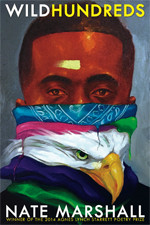Nate Marshall: Wild Hundreds
Nate Marshall’s first full-length collection, Wild Hundreds (University of Pittsburgh Press), opens with a familiar James Baldwin quote: “You don’t ever leave home. you take your home with you. you better . . . otherwise you’re homeless.” It’s an appropriate choice for an epigraph; Baldwin and Marshall both shared difficult relationships with ‘home,’ to say the least. Marshall was raised in Chicago, graduated from Vanderbilt, and received his MFA at the University of Michigan, having spent most of his adult life far from the eponymous Wild Hundreds (an area of South Chicago equal parts notorious and neglected). The neighborhood is so-named because of its location in the blocks numbered over 100. In Chicago, all main transit ends at 95th. Wherever Mr. Marshall has been, though, he carries his history with him and Wild Hundreds is a testament to home, to struggle, and to survival. Wild Hundreds is a reminder of the places most people would rather forget.
Marshall’s poetry has such a rhythmic percussiveness, what I’d call a drumbeat leitmotif, which forces an urgency on each word in the collection. Such is the case with the very first poem, “repetition & repetition &,” a poem delineating both an internal and external struggle with form and subject matter:
we are live
on the airwaves,
until they close,
in the pubs
until they close,
in the schools
until they close.
we are close
Marshall also shows a tremendous control of craft and form throughout the collection, seamlessly interweaving triptychs, couplets, and prose poems without feeling forced. The strongest poem of the collection, “god made the hundreds, man made it wild,” illustrates how a citizen can come to know their own neighborhood as a ghetto just from the outside looking in. It is a haunting piece. The speaker describes his own neighborhood from the perspective of mothers in other neighborhoods:
them mama tell them
it wild over there
she say over there buses quit
running like utilities
or resources
or dead boys
But Marshall offers this and the rest of the collection with a sort of comfort—this is reality—and a definite sense of pride putting this otherwise forgotten and foreign place on the map through poetry.
 Nate Marshall
Nate Marshall